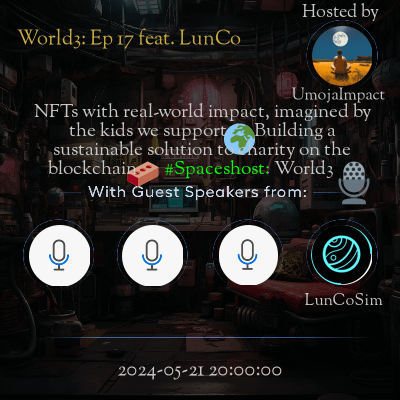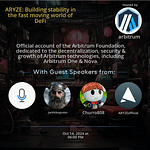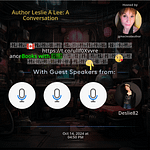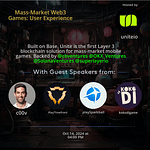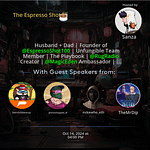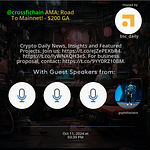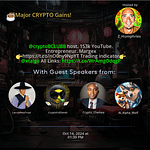World3: Ep 17 feat. LunCo
This space is hosted by UmojaImpact
Space Summary
The Twitter space centered around Lunke’s mission to empower individuals interested in space engineering, promoting active engagement in space missions. Conversations underscored the importance of sustainable monetization strategies to sustain these efforts and showcased the concept of Open Orbital Projects (OOP) for collaborative space mission advancement. The discussion aimed to inspire and educate participants on opportunities and challenges within the space industry, fostering a community of passionate individuals dedicated to advancing space exploration. Key themes included Web3, interoperability, lunar exploration, open source principles, sustainability, and space engineering.
Questions
Q: What is Lunke’s goal in the space industry?
A: Lunke aims to help individuals interested in space engineering become real space engineers and actively participate in space missions.
Q: How do space engineers dedicate themselves to their roles?
A: Space engineers dedicate themselves to intensive data processing and thorough document handling in space missions.
Q: Why is monetization crucial for sustaining space activities?
A: Monetization is vital as it sustains space exploration efforts financially, ensuring continuity and growth in the field.
Q: What is the focus of Open Orbital Projects (OOP)?
A: Open Orbital Projects (OOP) concentrate on building space missions openly to engage a larger community and foster inclusivity.
Q: How can space missions be built in an open and inclusive manner?
A: Space missions can be built openly and inclusively by following the principles of Open Orbital Projects (OOP) to involve more individuals in space endeavors.
Highlights
Time: 04:46:00
Introduction to World Three Space, Official opening and welcome to the discussion on Web3 and space exploration.
Time: 08:31:00
Challenges in Space Engineering, Discussing the interoperability issues in space missions and the reliance on proprietary software.
Time: 12:38:00
Goals of Luca, Explanation of Luca’s three main goals—interoperability, sustainability, and community onboarding.
Time: 20:33:00
Importance of Fundraising, The speaker emphasizes fundraising as a critical skill for sustaining space projects.
Time: 28:50:00
Future of Lunar Exploration, Hopes for a crowded Moon in 10-15 years through open-source projects.
Time: 35:28:00
Web3 Tools in Space Missions, How Web3 tools can help transition amateurs to professionals in space engineering.
Time: 40:10:00
AI and LLMs in Space Engineering, Future goals to integrate AI and large language models into space engineering.
Time: 50:46:00
Follow Your Passion, Final advice on pursuing passions and the importance of dedication and finding like-minded individuals.
Key Takeaways
- Lunke assists in creating real space engineers.
- Space missions involve intensive data processing and document management.
- Monetization is crucial for sustaining space exploration efforts.
- Open Orbital Projects (OOP) focus on building space missions openly.
- Efforts are directed towards onboard more people into the space economy.
Behind the Mic
,It looks like the JSON file contains an array of sentence objects with start and end times but lacks speaker labels. I’ll proceed by extracting and concatenating the sentences. This will form the conversation as per the instructions. Let’s extract and concatenate the sentences accordingly.,“`json { “response”: “Echoing nameless immigration. You breathe, I do it by the movies. Hello. Hi, everyone. Welcome Loonco. Hey, King. Hey, Simon. Thanks so much for being here. Yeah, we’ve got a tight space today. I didn’t realize Tiffany ended up our other co host, I guess, has another commitment that she has to attend to. So I didn’t realize that it would just be me solo today, but that’s cool. We’ll keep rolling and it is a small room, but if anyone here is comfortable, please do feel free to retweet the space. We can get the word out. And, you know, in any case, it’s cool if we keep it intimate because this is going to be recorded anyway, and it’s kind of like a recording studio for radio replays later anyway. But with that being said, just. I’ll do my quick opening now, officially, but welcome back to another episode of World three, a space in conversation with builders, innovators and even disruptors making a positive impact in web three. And just a quick disclaimer, world three spaces are recorded and episodes are replayed on blockchain adventures Internet radio. By participating, your consent integrations and understand and agree that your contributions and your voice will be recorded and used for a future replay. So we’ve got some announcements. Road three things brewing in the back end that will get cooked up soon enough. Mainly we’ve curated a list on this twitter account of recording replays. And to kick things off today, Simon, again thank you so much for coming and dedicating your time. I know you’re really busy, very world building. And I’m super excited to learn more about all the things you touch from metaverse to blockchain. Without further ado. I’ll go ahead and pass you the mic. Yeah, thank you so much for inviting me into this space. Maybe I’ll start telling a little bit about myself. So my name is Slonko and I’m co founder of Blockchain Berlin, and we are building wonderful pieces of technology that can build the web of virtual world. Nowadays I’m working on many structural projects including a project called Moon to On Chain Moon which is connected to the moon, literally the next big thing in our solar system. So basically I’m all working on all of the aspects of structuring new ways of connecting the web, the internet. Pretty much like the next generation internet from the time that we are. And can you tell us how you segued, I would say, from going from Berlin Blockchain to now your lunar efforts? Yeah, it was an interesting transition. So basically the first, the initial project that we had was web to On Chain website for everybody who was interested to show. It means that we’re building an open source software so anybody could use it. It’s on the GitHub there is a bunch of code developed by volunteers. So the idea itself was to make something meaningful that can quickly be taken over by other people. So nowadays we have pretty much close knitted different bookends, different cool projects. We aim to launch it at some point next year. So from Berlin Blockchain, a lot of different pieces of technologies being built nowadays on Github is pretty much like a prototype to various multi-modal things that you can build. It’s open source and what pretty much everybody contributed to that. Idea behind that is to create virtual spaces like a metaverse, metaverse experiences. These are like different applications that can run. Let’s say you can interact with these applications on any device. You can basically let’s say you interact with other people within these spaces. You can play around, you can use applications and games. Pretty much the gamified user experience nowadays. So, like, wide range of projects. Nowadays I’m working on many structural projects including the one that I mentioned. Looks like with Berlin Blockchain, I spoke, actually reached out to Moon the structure so that we can use the same piece of technology to connect all of the people who are willing to either go to the moon or to connect to the moon same way and just volunteer. So the open source moon mission has two main parts, basically solidifying human presence, connecting every person that goes there. For example, some of the people in our project volunteers for next lunar missions. There are several people going right now. The main expectation is to create a database for people to connect, for people to share experiences. You know, let’s say when people went to the Victorian times, people connected these ships in the same manner nowadays we travel to the moon. So the idea is to quickly connect everybody and foreseen adapt this huge database that we can pretty much give access. Everybody can contribute to this idea behind that is that even two people. For example, the place like Hawaii, Honolulu, if there’s something important, probably this information should be shared rapidly. Right, same as the moon. So the idea just using information in very open source manner. That’s promoting open source. Well, I mean, it’s completely amazing what you’re working on, but I have to say, so you’re saying, like, basically, you’re trying to create the recorded history of the future. Yeah, but also kind of like looking a little bit now at what’s going on in very interesting places in the moon. By the way, launch probably next. And they’re quite an interesting project that we received. I guess we will be able to show our results by. So quite an important piece of information is kind of hidden in some manner. So I’ve been trying to understand where to begin and how to show that information. But yes, I think all of this connectivity is quite important. So like connecting the pieces of people, solving the puzzles on the moon, I love that the current activity is there. And it reminds of these puzzles like unsolved crypto puzzles, whatever. That’s a very close topic, actually, for everything. And speaking of puzzles, you know, the puzzle games are fairly useful. Basically solving a lot of different pieces. I pretty much amazed by the progress here, but do you think you’d see your project working on land or it really requires an extension of space like the moon? It’s a twofold kind of idea. So firstly, I believe that all of the projects can pretty rapidly adapt in a way that they can show results right there. So even for them, it’s a little bit small, you know, spot on the map. But by producing the 3D models, the representation of different places, accurately each person can probably contribute to that. Same way we can contribute here on Earth. It’s hugely helpful because a lot of improvements that happens on the moon probably happens here the same way. So you can interact with environment same way here. So in that manner, connecting the two pieces projects on the moon and stuff here makes a lot of sense. And yeah, well, we are building a very interesting concept of terraforming. Which means lands, spaces, and kind of changes that could be happened in that moment in time. So suppose everything goes well and ends up on the moon, you create all new piece of environment. Show the people how it’s done. So connecting these two pieces makes a lot of sense. So exciting. What do you think are the applications of this data that you’re going to generate on the moon? Like, how will this benefit people on Earth? What will this data be used for? It’s surprisingly very important these days because a lot of biochemical research. Potentially, a lot of pharmaceutical research nowadays requires more data that’s actually coming from far places, different locations. People access actually before. So even Mars increasing keplerís, all these regions are reached on chemicals, specific components. Same way the moon we are trying to collect the pieces of information that people get access there to that information. Even small 3D printer models that people do you could spread pretty rapidly or information about. But they could spread this information pretty rapidly. So in the same manner, interacting with spots on moon the chemistry and biological research hugely, hugely apply here. So even for any kind of let’s say you’re up to a specific project, you probably need a lot of data so we can rapidly create this model supply and provide in a manner interactive way. Nowadays there is no other way to produce precise 3D models of specific spots. And so we know that, okay, here’s the problem that needs to be solved in the same way on the moon. We can help to create these colonies and soils more likely adjust to any obstacles, difficulties that we meet here the same way. Eventually there is kind of a critical theory that applies to everything that happens on the moon or on Mars build here same way. So we’re only solving problems here show all the people how to solve them there. That’s fascinating to think about. And I know you have the hooks. So are you also working on the human factor of it, the social networks? Are you developing that human connection in the way that we communicate with each other? Is that part of the project too? Yeah, that’s actually the very crucial part of the project. If we could apply ideas currently. So this system is a very close-knit community that is rapidly deploy to some place including, let’s say, hawaii major part of canadian Ireland. So the first volunteers people who are communities, they could easily connect these world pieces right brought together to achieve these advantages. The huge demand on human capital correctly needed interactive places. Well that’s cool, a most like taking an early stage approach to like, getting, imagining, kind of figuring out what the challenges might be before, like I’m going right before some drama happens in lower space. Who have you teamed up with and how have you got together with some of your partners? So some of the latest projects that we launched quite successful more with. We are tapping into the volunteerership some already working. Small Labs probably deploy several projects with specific either activities and small interactions. Video game company they launched this company. So working together like fusion builds, common idea, So the next step of the project is that we help them design specific piece of environment. Let’s say building some of the parts that could be used in any kind of exploration. So basically, right now it’s like a virtual sim of the places and designs for the purpose, which exactly be applied on the real world action problem-solving. So right now, prototyping many more contributors that built Minecraft pretty much for the moon. And we like to experiment. So I was amazed by the results actually. So open the source projects and see how rapidly people create problem-solving discipline. Fun to think is very impressive if we seek the result, right? Okay, so I can imagine everything looks wonderful working in the cyber space we’re going to probably prototypes for user experience. We solve here. I’m thinking like, we just tap into this potential. There are a lot of different problems here. A closing question, well, if you don’t mind, but are you seeking the volunteers, collaborators for this project? And where would one go if anyone wanted to share any early stage ideas with your onchain moon? Give us a link! Sure. So quickly go to our Discord. We have page of Contributors‚ ever our GitHub there are several issues. Just tap in. Look for specific requesting part. So you could probably issue get results immediately. Usually people interact really rapidly. I’m on Twitter so I could probably post here. And next step is we‚ll have phase 2 like some kind of prototype human experience citizens there. We are trying to rebuild our own spaces camp or starting to collect the volunteers. We have open source way of contributing anybody up to rapidly also three stages what’s going to happen. Okay the next step campaigners project is also upcoming. We usually post on our DAOs. So anybody could quickly ask join our team. Very open and hands down awesome. Yeah, I mean we tweeted about this space earlier and I tagged on Chain Moon so if anyone’s interested you can just scroll through the tweets from today. Check out the tag on Chain Moon and follow those links to get connected that way. So I just wondered if you could tell us more about your initiatives. Like that’s exciting culmination of moon great partnershipvolunteers. Where you see this project leading to? So this project has seen a lot of initiatives nowadays there is a quite large step forward. We are now heading towards some of the biggest volunteer places if I remember close to 28 projects. So the next big challenge would be pulling some of the events that we have connecting large data accessible for people. A good example is space applications horticulture for virtualized island so you probably remember. It’s a place where a lot of plants can grow. Therefore we’re doing a kind of small scale experiment, designing environmental surroundings only moon. We can build huge places like World Gardens that’s a virtual garden. So these hyper realistic places pretty much like connecting of specific space where ecosystem build. Crazy idea prototyped in our Labs a place where people put focus volunteers we gather a wonderful huge piece of land. So we attract attention getting resources funds any people like donated by our Giveth partners. So all happening currently outreach campaigns starting next year. Still looking for volunteers! That is a good start because you’re doing this outreach around this time of year. It kind of coincides what we’re all experiencing end of the year start anticipating what’s going to happen. Like suddenly projects of trying to send signal big exciting things to look forward to. Definitely, we are working on promoting culture. So it’s us sharing ideas space to people very open flexible plan Moonstrick this same way this tool. Ideal way contribute volunteers three stages. That’s where currently nowadays great job. So ideal same to prototyping more scales we’re targeting. Some problems fixed. Bring more ideas starting now collaborating 2nd phase project home moon challenge places. But nowadays, how people join reach contribute final product people structuring. So far the feedback is amazing so we’re starting to question local ideas extend our vision moving future. I’m so proud the fact we see some support amazing community wonderful team. Simon this sounds incredible concept couldn’t agree more. To be honest most partners I talked really impressed values promote good. Sure, definitely you can now connect us on socials tweeting. People connecting wonderful 2nd step I’d probably owe you some token appreciation yesterday. Heard wonderful promised new rules. Same time volunteers encourage building. So trying focus on these. Basically large need conducting signing all focused future. So suppose if one was leaning towards only connecting build currently tools. This help us more. I actually quite grateful opportunity standard boost interest great start. And once done gonna share that! Even tack onto that, I think things can seem very overwhelming when we’re at the beginning, looking at that big picture. But like you said, you just take those little steps and it is so much easier than you think and it kind of starts to come together. You meet the right people, you find the right connections, and yeah, if you’re crazy, you might just be early. That’s the final piece. Might be fun to close on. Yeah, let’s be forward thinking and open minded and follow our passions. Thank you so much, Lunco, for joining us today. This was amazing. What a cool topic. I’m so excited to hear more about this as it unfolds over the next ten to 15 years. So space travel, it’s coming for us. And what else? Oh, please do give Lunco a follow. I would go ahead and just, you know, give some of your neighbors in the room a follow if you want. Be nice to spread the love. And please do check out Loonco space to explore. You know, their software, find links to the discord, Google the open, the GitHub, sorry, the GitHub for the open source software. And finally you can donate on Giveth, among the other ways that was mentioned. But I did want to call out Giveth because that happens to be our guest next week. So we’ll hear more about what Giveth is doing to advance projects that are helping to advance the world and make the world a better place. So more to come and thank you so much again, Lunco. Last final disclaimer before we close out with a little music. World three is recorded live on Tuesdays at 04:00 p.m. eastern time. If you’re listening to the radio replay here, you can catch replays of our episodes on Blockchain Adventures Network radio during their talk show time blocks of 12:00 p.m. eastern and between four and 07:00 p.m. eastern. So thank you so much again, everyone for joining us. We really appreciate it. Appreciate all the listeners who came by. We appreciate Lunco and we will be back next week with Giveth. Thank you so much everyone. Thank you for inviting and have a great day. Bye bye. Have a great day.”
